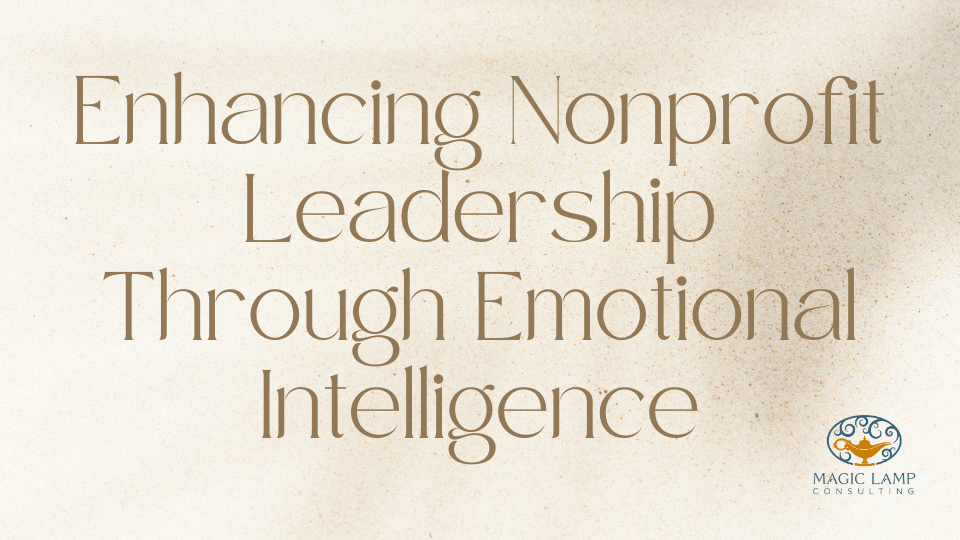In nonprofit organizations, diversity, equity, and inclusion (DEI) go beyond simple buzzwords—they...
Enhancing Nonprofit Leadership Through Emotional Intelligence

Leadership in the nonprofit sector is a complex journey that demands a unique blend of vision, empathy, resilience, and adaptability. Unlike corporate organizations, nonprofits often navigate with limited resources, high stakeholder expectations, and the imperative of driving social change. In such a context, emotional intelligence (EI) stands out as a critical asset for effective leadership and understanding the unique challenges you face.
Emotional intelligence, the ability to recognize, understand, and manage one’s own emotions and the emotions of others, is more than just a buzzword—it’s a leadership tool that can enhance collaboration, improve decision-making, and foster a more cohesive work environment. For nonprofit leaders, developing emotional intelligence is key to improving relationships within internal teams and strengthening external partnerships and client interactions.
The Role of Emotional Intelligence in Nonprofit Leadership
Emotional intelligence is composed of five key elements: self-awareness, self-regulation, motivation, empathy, and social skills. These elements are crucial for nonprofit leaders who often work with diverse stakeholders, including staff, volunteers, donors, and clients while balancing the pressure to deliver on their mission.
In nonprofit settings, emotional intelligence enhances leadership in several ways:
- Building Trust and Collaboration: Nonprofit organizations thrive on collaboration within teams and external partners. Leaders who demonstrate high emotional intelligence are able to build trust, create a positive working environment, and encourage open communication, which is vital when managing teams that are often stretched thin.
- Managing Stress and Preventing Burnout: The nonprofit sector is notorious for high-stress levels due to the work's emotional nature, limited funding, and the pressure to achieve impactful results. Emotionally intelligent leaders can better manage their own stress and support their teams in avoiding burnout by recognizing emotional cues early on and fostering a culture of self-care and resilience.
- Enhancing Stakeholder Relationships: Whether it's engaging donors or serving clients, emotional intelligence helps leaders navigate complex relationships. A leader attuned to stakeholders' needs, concerns, and emotions can create stronger, more authentic connections, which in turn helps foster trust and loyalty.
Key Components of Emotional Intelligence for Nonprofit Leaders
- Self-Awareness
Self-awareness is the foundation of emotional intelligence. Leaders who are self-aware understand their strengths, weaknesses, emotions, and the impact of their behavior on others. In nonprofit leadership, where decisions often carry emotional weight, self-awareness allows leaders to act with integrity and transparency.
Tips for improving self-awareness:
- Regular Reflection: Take time each day to reflect on your emotional responses to various situations. What triggered certain reactions? How did your emotions influence your behavior? Regular reflection helps you gain insight into your emotional patterns and their effects on your leadership style.
- Seek Feedback: Ask trusted colleagues for honest feedback about how your behavior and emotions are perceived. This external perspective can help you identify blind spots in your self-awareness.
- Mindfulness Practices: Mindfulness exercises such as meditation or deep breathing can improve your ability to stay present in the moment, making it easier to recognize your emotions as they arise.
- Empathy
Empathy is the ability to understand and share the feelings of others. It is essential in the nonprofit sector, where leaders often work with vulnerable populations or individuals experiencing significant challenges. Empathetic leaders are better equipped to connect with clients, build strong teams, and navigate the emotional complexities of their work.
Tips for enhancing empathy:
- Active Listening: Practice listening to the words people are saying and their emotional undertones. What emotions are they communicating? Ask open-ended questions to deepen your understanding of their perspective.
- Step into Others’ Shoes: Regularly challenge yourself to see situations from the viewpoint of your team members or clients. Consider what emotional or practical challenges they might be facing and how you can provide support.
- Develop Cultural Competency: Nonprofit leaders often work with diverse communities. Building your understanding of different cultural backgrounds and experiences can deepen your ability to empathize with those you serve and work alongside.
- Relationship Management
Nonprofit leaders must balance a range of relationships, from board members and staff to clients and donors. Strong relationship management skills allow leaders to navigate these relationships with care and foster long-term collaboration.
Tips for improving relationship management:
- Foster Open Communication: Create a culture where open and honest communication is encouraged. This builds trust and ensures that team members feel comfortable sharing their ideas, concerns, and feedback.
- Conflict Resolution: Be proactive in managing conflict within your team. Approach disagreements with an open mind, listen to all parties involved and facilitate a fair and constructive solution for everyone.
- Show Appreciation: Regularly acknowledge the contributions of your team, donors, and partners. Genuine expressions of appreciation strengthen relationships and encourage continued engagement and loyalty.
The Ripple Effect of Emotional Intelligence
The impact of emotional intelligence in nonprofit leadership extends beyond the internal team. Leaders who practice emotional intelligence model healthy communication, empathy, and relationship-building for their staff. This positive behavior trickles down to client interactions, improving service delivery, client satisfaction, and overall outcomes.
For example, an emotionally intelligent leader who fosters empathy and open communication within their team will likely see these same traits reflected in the team’s interactions with clients. This can lead to more compassionate and effective service, a testament to your leadership and the impact of emotional intelligence on service delivery.
Moreover, emotionally intelligent leaders are better equipped to manage external partnerships. Whether cultivating relationships with donors or collaborating with other organizations, leaders who demonstrate empathy, authenticity, and strong communication skills can inspire trust and foster lasting connections that benefit their organization’s mission.
Final Thoughts
In the fast-paced and emotionally charged world of nonprofit leadership, emotional intelligence is not just a leadership skill—it’s a transformative force. Nonprofit leaders can create a more cohesive, resilient, and effective team by improving self-awareness, enhancing empathy, and developing strong relationship management skills. These efforts will ultimately lead to better service delivery, stronger stakeholder relationships, and a greater impact on the communities they serve, inspiring you to harness the power of emotional intelligence in your leadership journey.
Nonprofit leaders who prioritize emotional intelligence will not only improve their teams' well-being but also drive their organizations' success, creating a ripple effect that extends far beyond the walls of the organization itself.




